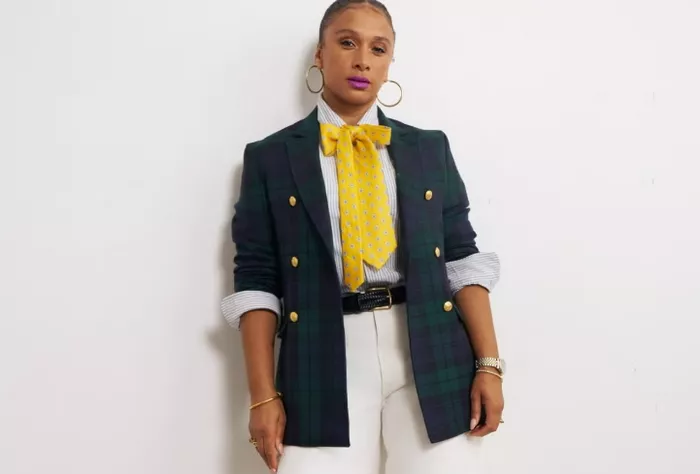There are few menswear brands with as devoted a following as Noah. The clothes are undoubtedly part of its appeal—a distinctive fusion of classic preppy aesthetics and ‘90s surf and skate culture. From laid-back hoodies and bold graphic tees to polished navy sport coats, sturdy chinos, and vibrant madras jackets, Noah captures a unique style. But it also prioritizes slow, responsible production, and its popular collaborations with Barbour, Timex, and even legendary English rock band The Cure have elevated its cultural cachet.
Yet, Noah is more than a clothing brand. Buying into Noah means becoming part of a carefully cultivated community—a distinct world of ideas, experiences, and values. At the heart of that world is cofounder Estelle Bailey-Babenzien.
Bailey-Babenzien is the creative force behind the interior design of every Noah store. Alongside her husband, Brendon Babenzien—formerly of Supreme and now men’s creative director at J.Crew—she helped relaunch the then-dormant brand in 2015. Together, they’ve crafted retail spaces in Asia and the New York flagship that are more than shops; they’re curated expressions of American fashion and global culture. The design seamlessly integrates the clothing with books, music, emerging art, and vintage décor, reinforcing the brand’s values of sustainability and meaningful design.
When interviewed in March, Bailey-Babenzien was preparing for the opening of 199 Mulberry, an expansion of the New York flagship. The space, she explains, represents her most complete expression of Noah’s creative vision. It features higher-end clothing alongside a curated selection of rare books, records, vintage watches, and art. “I like to think of it as an oversized salon with a few treasures to discover,” she says.
Later this year, Noah will open another location in Los Angeles, continuing its physical expansion. While many modern brands prioritize e-commerce, Noah still places value on physical spaces. For Bailey-Babenzien, the in-store experience is integral to the brand’s identity.
“These are stores that people could hang out in, and they’ll not just be talking about the clothes but what you do in the clothes, which is more important,” she explains.
Bailey-Babenzien’s emphasis on community is rooted in her multifaceted early career, where she explored interior design, fashion, and music after graduating from London’s Central Saint Martins. Fashion felt too exclusive, and the music industry lacked diversity. What she truly sought was the freedom to create a space of her own. Noah became that space—a convergence of art, design, and fashion. She even creates custom furniture and garments for the brand, making each store a unique, lived-in experience.
During the 2010s, she was among the first to popularize the “living room storefront” concept, now a standard for many lifestyle brands. The SoHo flagship reflects a blend of her husband’s Long Island roots, her English upbringing, her Ghanaian heritage, and input from local artisans. The result is less of a retail shop and more of a community hub—inviting, filled with natural light, and furnished with cozy seating. It’s a space that draws in the fashion-forward crowd of Lower Manhattan for more than just shopping; it’s where conversations happen and connections are made.
“The idea is like, yes, come here. Sure, you can get some nice clothes, learn about the fabrics, whatever. But hang out,” Bailey-Babenzien says. “What else are we talking about? What’s going on in the world? What are you doing? Are you into writing, reading, skateboarding? What is it that kind of makes you tick? So we try to create these environments that foster that and also might provoke conversations.”
Importantly, Noah’s sense of community is inclusive. It isn’t reserved for fashion insiders or social media tastemakers. Bailey-Babenzien recalls a recent moment when a family of six visited the store. Each person—child, parent, and even the grandmother—found something that resonated with them.
“I was like, ‘This is exactly it,’” she reflects. “It can span generations.”
In a world where many brands chase trends, Noah is quietly—and intentionally—building something deeper. Under Estelle Bailey-Babenzien’s vision, it’s not just about what people wear. It’s about how they live, connect, and express themselves. Noah, in her hands, is evolving from a brand into a movement.
Related Topics
- Social Media Divided as Influencer Debates Value of $16,000 ‘Lamp Shade’ Designer Dress
- MamamiaBoutique Launches with Chic Collections Designed to Empower Modern Women
- Vintage Fashion Revival: The 7 Pre-Loved Brands Fashion Insiders Are Obsessed With

